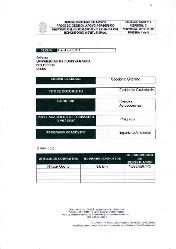| dc.description.abstract | Este trabajo de investigación tiene como objetivo determinar los cambios del estado de la vegetación a través del índice de vegetación de diferencia normalizada (NDVI) en el municipio del Melgar, en el periodo de tiempo comprendido entre los años 2015 a 2020, esto para analizar los cambios de uso del suelo que ha sufrido el territorio. Para el desarrollo de esta investigación se aplicó una metodología cuantitativa con un método exploratorio a través de la aplicación del índice de vegetación de diferencia normalizada del cual se extrajeron datos estadísticos a través de su procesamiento en un software GIS como QGIS o ArcGIS, del cual se obtuvieron tablas de resultados con las cuales se graficaron y analizaron los cambios presentes en el periodo de tiempo establecido. Con la aplicación de este índice se pudieron obtener resultados los cuales establecieron las zonas que han sido afectadas por factores naturales o actividades antro génicas, y de esta manera se logró comparar con los instrumentos de gestión públicos del municipio de Melgar el cómo se ha documentado los cambios del estado de la vegetación en el territorio. Para concluir, se puede destacar que el índice de vegetación de diferencia normalizada es de gran utilidad y aplicabilidad para la determinación de vegetación densa y saludable o la inexistencia de la misma, a su vez es importante resaltar la eficacia de las nuevas tecnologías y software que nos permiten desarrollar nuevos procedimientos y determinar parámetros como el estado de la vegetación de una zona sea agrícola, o boscosa. Así mismo, la realización de un estudio aplicando este NDVI permite comprender los cambios de un territorio, las alteraciones en sus diferentes dinámicas y cómo estas han influido en las transformaciones del lugar al darse una expansión urbana y un aumento de las actividades económicas desarrolladas que generan la reducción de la cobertura vegetal y por ende el cambio de las condiciones naturales del ecosistema. De igual manera, este método de evaluación aporta la información necesaria para la toma de decisiones a la hora de mejorar las herramientas de gestión y planificación de un territorio con el fin de restablecer las condiciones naturales de los ecosistemas que han sido impactados por actividades antrópicas o factores naturales. ABSTRACT: This research work aims to determine changes in vegetation status through normalized difference vegetation index (NDVI) in the municipality of Melgar, in the period from 2015 to 2020, this to analyze the land use changes that the territory has suffered. For the development of this research, a quantative methodology was applied with an exploratory method through the application of the normalizedd difference vegetation index from which statistical data were extracted through its processing in GIS software such QGIS or ArGIS, from which results tables were obtained with which the changes present in the establishedd time period were plotted and analyzed. With the application of this index results were obtained which established the áreas that have been affectedd by natural factor sor anthropogenic activities, and in this way it was posible to compare with the public management instruments of the municipality to Melgar how changes in the state of vegetation in the territory have been documented. In conclusion, it can be noted that the normalized difference vegetation index is of great use and applicability for the determination of dense and healthy vegetation or the absence of it, in turn it is important to highlight the effectiveness of new technologies and software that allow us to develop new procedures and determine parameters such as the state of vegetation in an área is agricultural, or wooded. Likewise, the conduct of a study applying this NDVI allows to understand the changes of a territory, the alterations in its differentdynamics and how these have influenced the transformations of the place by giving an urban expansión and an increase in the economic activities developed that generate the reduction of plant coverage and thus the change of the natural conditions of the ecosystem. Similarly, this evaluation method provides the information necesary for decisión-marking when improving the management and plannign tolos of a territory in order to restore the natural conditions of ecosystems that have been impacted by anthropic activities or natural factors. | es_CO |

